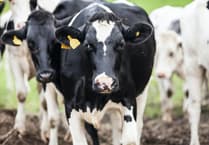If you watched Ffermio on S4C recently you will have been reminded of the emotional and financial impact of bovine TB on farming families, writes FUW Brecon and Radnor Executive Officer Kath Shaw.
The reminder of the horrific toll this disease takes on rural Wales and our farmers would have hit home with many of us. I sincerely hope that the Minister and her staff will take note of the most recent example and seriously reconsider the policies that have been in place until now, which clearly don’t do enough to eradicate the disease from our farms.
If you take the emotions out of the subject for a brief moment, and examine the latest official government data on bovine TB, it shows a mixed picture of the disease across England and Wales. In Wales, the number of new TB herd incidents on the 12 months to the end of September 2023 increased by 6% year on year. However, England overall recorded its fewest new herd incidents over 12 months since 2004, while the High Risk Area recorded its fewest since 2002.
In the twelve months to the end of September 2023, 9669 Welsh cattle were slaughtered due to bTB, representing a marginal 2% increase in the number of animals slaughtered compared with the previous twelve month period. However, regional data over the same 12 month time period remains variable; with a rise in the number of cattle slaughtered in 3 out of the 5 bTB Areas in Wales. The highest reported increase was in the Low TB Area, where the number of cattle slaughtered rose by over 97% in 2023 compared with 2022 despite bTB cattle controls in Wales being some of the strictest in the World for more than a decade.
Speaking to members we know that those who keep cattle are thinking that if they’re not currently down with the TB it is just a matter of when and not if. Given that the current eradication strategy isn’t getting the needed results, we are naturally questioning the rationale behind the Welsh government’s decision to reintroduce pre-movement testing for cattle movements within and from the low TB area and to extend the requirement for post-movement testing in the intermediate TB areas from 1 February 2024.
Moreover, despite differing scientific opinions regarding badger culling, the presence of bovine TB in badgers is recognised by all credible scientists as a major obstacle to disease eradication. Despite a wealth of evidence, it remains incredibly frustrating that the UK and Welsh Governments continue to pursue notably different TB eradication strategies; with a current Programme of Government that ‘forbids’ badger culling under all and any circumstance in Wales.
Despite these red lines, the FUW continues to lobby the Welsh Government for an holistic approach to bTB control and I can assure members that the FUW is working hard on their behalf to see a change in policies that don’t deliver on their promises.




